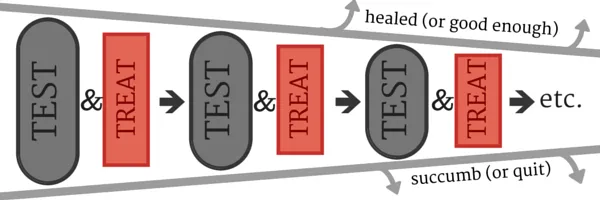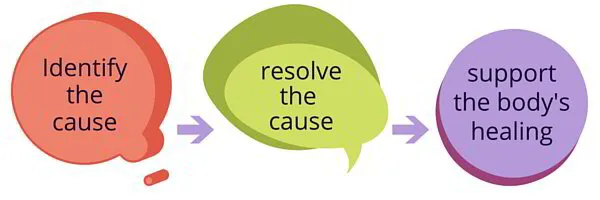Do you have a health symptom or a chronic emotional challenge such as an allergy, weight problem, rage attacks, or debilitating anxiety?
I’m willing to bet that you’ve gotten all kinds of different opinions about what to do about your issue. And none of them have worked.
For any given symptom – physical or emotional/psychological – there are health professionals all over the world with opinions about how to best go about dealing with this problem you have. And most of those opinions come from the same paradigm, which asks, “What’s the mechanical cause?”
“What’s the mechanical cause?” is the wrong question.
The health industry seeks first to eliminate the mechanical cause of your symptom.
For example, if you’re overweight, you’ll need to reduce the number of calories going into your body and increase the number of calories that your body uses up. If you get upset in certain situations, then you’ll need to reduce your exposure to those types of situations or change your environment.
But the mechanical aspects of a symptom – emotional or physical – occur as a result of a special biological program.
You don’t get overweight because your calorie intake is greater than your calorie expenditure. You don’t get upset in certain situations because that situation or environment is inherently hurtful.
You get overweight because you have an unresolved trauma for which being overweight is the best interim solution. Starving yourself and exercising will only “work” if they somehow resolve that underlying trauma. (Which they likely won’t)
You get upset in certain situations because you have an unresolved trauma for which avoiding that type of situation is the best interim solution. Avoiding or demanding that the world around you constantly accommodate you will only “work” if somehow that resolves the underlying trauma. (Which it likely won’t)
“What’s the right treatment?” is also the wrong question.
When mechanical solutions don’t work (which is most of the time), the health industry offers you treatment.
A pill, surgery, energetic balancing, nutritional regimen, or feather up your butt …whatever it is, its purpose is rarely to help you resolve the symptom.
Rather, its purpose is to help you ignore the symptom.
Health professionals have strong financial incentives to move you to this stage as quickly as possible and then keep you in it as long as possible. But, as hundreds of millions of people can attest, the “treatment” approach has a very low success rate in actually resolving symptoms.
“What’s my predisposing flaw?” is the wrong question.
After mechanical changes and treatments don’t work, health professionals start looking at “factors.” Our genes. Lifestyle. Statistics about other people with our diagnosis.
The trouble with this approach to solving a symptom is that it makes it impersonal. It makes you impersonal. Just a statistic.
And this turns your symptom into part of you are.
While there are benefits to reaching this stage – a disability pension, a social life through support groups, an inexhaustible supply of excuses to avoid doing anything you don’t like to do – making your symptom part of your identity does not help you to resolve the underlying trauma.
And what if the celiac meetup closes down for the summer or there’s a falling out at your psychopaths and psychotics weekly social group? At such times, you might feel very alone after all. And find yourself wondering, “Is there really no other option than to just live with this condition?”
“What’s the spiritual reason for my symptom?” is the wrong question.
It’s times like these that we might try praying for miracles. Or the “spiritual bypass” of just transcending the whole thing and moving to la-la land, sitting in a robe and meditating the rest our lives away.
Alas, becoming a better person also tends not to resolve the underlying trauma for which our symptom is an interim solution.
Not just because becoming a better person is brutally hard …but because your symptom isn’t about something being wrong with you.
- Your symptom is not a punishment.
- Your symptom is not a judgment.
- Your symptom is not a result of “society,” or your “upbringing.”
- Your symptom is not because you are doing something wrong.
- Your symptom is not because you are thinking the wrong way.
- Your symptom is not because you have a bad attitude.
- Your symptom is not a consequence of lacking a skill.
Your symptom is an interim solution for an unresolved trauma.
As long as that unresolved trauma (a “biological conflict”) remains
- unconscious,
- unresolved, and
- traumatic for you
…you will continue to generate your symptom.
What Purpose or Benefit is this Symptom Giving Me?
That’s the right question.
In what way might this biological program we call a “symptom” be providing some benefit or interim solution?
To get rid of your symptom for real, you’ve got to go up to that wall. You’ve got to face your stuff.
But this is the thing that we just don’t want to do. We want to avoid the wall, escape the barrier. We want to keep on going with whatever is normal.
Normal feels safe. Normal costs the least amount of energy. We’ll hold onto normal, even if it sucks.
Confronting and moving through “incurable symptoms” is not impossible. People literally do it all the time.
But it costs energy. It forces you to focus your attention instead of tuning out. It forces you to keep asking questions even though you’ve already gotten maybe dozens of (incorrect) answers.
It forces you to examine the very things that you find traumatic and painful.
A Better Question
“Is the cost of this symptom greater than or less than the benefit that I am getting from it?”
What, exactly, are you getting out of having your symptom?
Is it sympathy? Is it money? Is it a daily routine? Is it a sense of identity? And what is the value of that to you?
There is always a really good reason for your symptom. Most health professionals don’t get this. We have a cultural paradigm that says illness is random and meaningless, and that we’re helpless victims of whatever shit Nature throws our way.
But if you want to overcome your symptom, you have to get this.
Your symptom is providing a benefit that you will lose if you heal the symptom. This is the reason you have not healed it.
When I realized this, I healed: panic disorder, an ovarian tumour, chronic bronchitis, paralysis in my left hand (MS), sciatica, and a 20+ year addiction to nicotine.
This was just some of my own crap. I’ve also helped other people to heal all kinds of stuff (and really fast, too).
The solution isn’t easy, but it’s simple. You just need to ask that question.



